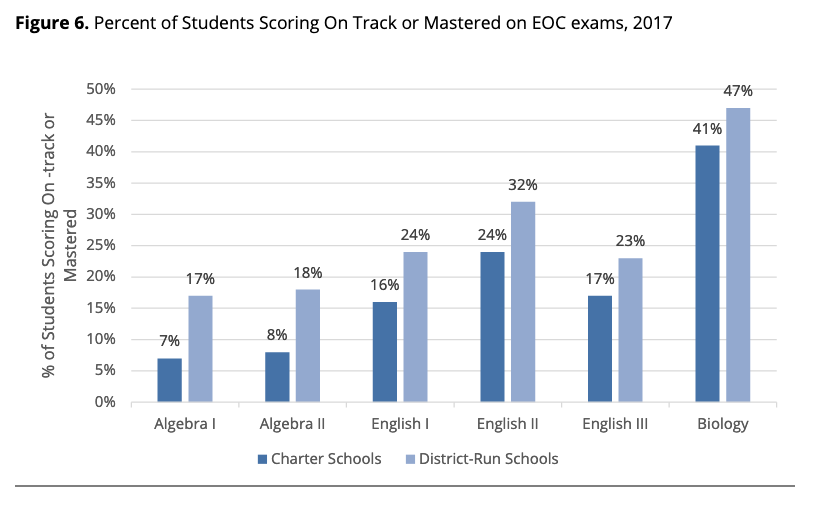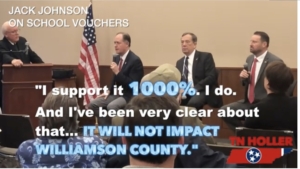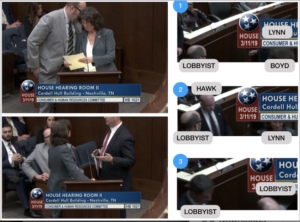(another) BAD WEEK FOR WORKING WOMEN
Republican lawmakers on the House Employee Affairs Subcommittee rejected four bills that would improve working conditions for women and families in Tennessee-all in less than an hour.
Republican lawmakers on the House Employee Affairs Subcommittee rejected four bills that would improve working conditions for women and families in Tennessee-all in less than an hour.
Gov. Bill Lee’s proposal to create a new state agency to oversee charter schools Tennessee passed the House Education Committee today on a 13-9 vote.
House Bill 940, as amended by the committee, would create a new charter school commission within the state education department and take over duties relating to charter schools currently handled by the state board of education.
The most controversial component of the legislation—a measure that would allow the new commission to approve charter school applications anywhere in the state without local school board input—was removed at the behest of nervous Republicans who likely heard an earful from their local public education officials.
In the bill’s current form, new charter applications would first be heard by local school districts. In the event that local school officials deny an application to open a new charter school, the new nine-member commission, appointed by the governor and approved by the legislature, could hear an appeal from the charter applicant and overturn the local decision.
As we previously wrote, charter schools are essentially private schools which take public school dollars away from brick and mortar public schools. Many are fly-by-night operations that take as much public money as they can and then disappear.
In the past week, New Vision Academy closed down in Davidson County because of problems with building fire codes. According to reports, a federal investigation also is being conducted into its operators.
This bill would mean charter schools like New Vision could be approved by a board that doesn’t even live in an area, leading to money for those kids being steered away from that area’s public schools – including in rural areas of TN which already barely have enough money to fully fund their existing public school systems.
Rep. Antonio Parkinson (D-Memphis) seemed to take morbid delight in the fact that this would mean charter schools opening up in districts around the state the way they have been in Shelby County, and had this to say:
“One thing I do like about this bill: Everybody gets a taste of the charter medicine throughout the state… everybody gets an opportunity to feel what we’ve been feeling in Shelby County. Under the state school board, there have been 70+ applications, but the board only approved 3- and the 3 were in Shelby and Davidson County. Imagine that. This opens up a nice little floodgate for the rest of y’all to see what we’ve been screaming bloody murder about. Y’all get a chance to feel what that feels like, and see what we’ve been screaming about the last few years.”
Or, as Rep. Jason Hodges (D-Clarksville) put it:
“Just because someone’s unhappy with the schools in their district doesn’t mean they need to take steps to destroy the schools in my district or other districts. The bill wouldn’t just affect their communities, it affects all communities. Charters may not be in Montgomery County yet, but if this happens they’ll be there soon destroying our public school system. No thank you.”
Two issues almost completely absent from the Education Committee’s debate of the bill: the costs passed onto local school districts when a new charter school opens and the academic effectiveness of charter schools in Tennessee.
The legislature changed state law in 2002 to allow for the creation of charters schools, which are funded by state and local tax payers but operate independently, picking their own curriculum and managing their own budgets.
Over the years, lawmakers have loosened the rules and added tax dollar investments to allow for more charter schools and enrollment at charter schools has jumped more than 500 percent since 2010.
The program keeps growing in spite of the fact that, statewide, students at Tennessee’s charter schools under performed district-run schools on end-of-course exams.

And according to a 2018 report by the Tennessee Department of Education, “both charter schools and district-run schools display considerable variation in overall effectiveness” as it relates to student academic progress.
Still, there are 116 charter schools operating in Tennessee today. And Gov. Lee’s new charter school agency could expand the charter footprint even further.
The academic growth and success of students should be primary consideration when lawmakers consider whether a program is worthy of additional investment. But that issue was not discussed on March 20.
“It’s probably the worst charter bill I’ve ever seen, and I can’t see legislators passing it,” said Jim Wrye, chief lobbyist for TEA. https://t.co/6jxOf6cxWX
— TN Education Assoc. (@TEA_teachers) March 12, 2019
Next step:
The bill will be heard next by the House Government Operations Committee, which meets next on Monday, March 25 at 2 p.m.
How they voted: House Education Committee passed the bill 13-9, March 20.
Representatives voting for the bill:
Rep. Charlie Baum, R-Murfreesboro, District 37
Rep. David Byrd, R-Waynesboro, District 71
Rep. Scott Cepicky, R-Culleoka, District 64
Rep. Bill Dunn, R-Knoxville, District 16
Rep. Tom Leatherwood, R-Arlington, District 99
Rep. Debra Moody, R-Covington, District 81
Rep. John Ragan, R-Oak Ridge, District 33
Rep. Iris Rudder, R-Winchester, District 39
Rep. Jerry Sexton, R-Bean Station, District 35
Rep. Kevin Vaughan, R-Collierville, District 95
Rep. Mark White, R-Memphis, District 83
Rep. Ryan Williams, R-Cookeville, District 42
Representatives who voted against the bill:
Rep. Mark Cochran, R-Englewood, District 23
Rep. Jim Coley, R-Bartlett, District 97
Rep. Kirk Haston, R-Lobelville, District 72
Rep. Chris Hurt, R-Halls, District 82
Rep. Terri Lynn Weaver, R-Lancaster, District 40
Rep. Vincent Dixie, D-Nashville, District 54
Rep. Jason Hodges, D-Clarksville, District 67
Rep. Harold Love, Jr., D-Nashville, District 58
Rep. Antonio Parkinson, D-Memphis, District 98
Absent/Missed the vote:
Rep. John Mark Windle, D-Livingston, District 41
This week at a budget meeting in the House Finance, Ways, and Means Committee, Rep. John Deberry Jr (D-Memphis) questioned the need for the Tennessee Human Rights Commission which was established to uphold the rights of Tennessee’s minority and disability communities.
Brad Fiscus is a veteran teacher, a leader in the Tennessee Conference of The United Methodist Church, and a member of the Williamson County Board of Education, the following Op-ED are his personal views and do not represent the thoughts or opinions of Williamson County Schools or the Board of Education.
During Tennessee’s State of the State address, Governor Bill Lee made it clear that
privatizing public education would be a significant initiative of his legislative agenda.
While he professed his support for public schools, he also laid out his plan to strip away
funding from public schools.
Net neutrality is an issue that extends far beyond Tennessee, but could have major implications for Tennessee business owners. Under current state laws, there are no net neutrality rules.
With net neutrality rules, major broadband internet providers like Comcast Xfinity and AT&T are classified as “common carriers.” The distinction means internet service providers must treat all internet content and data equally – “net neutrality.”
Functionally, net neutrality means that internet providers are not allowed to block websites they don’t like or are owned by a competitor. They also cannot charge more to subscribers for using data hogs like YouTube and Netflix over Twitter or local news sites.
For small business owners, the most important net neutrality protection may be that common carrier internet providers would be prohibited from giving preferential treatment – like faster speed – to one website over another. Think: Amazon.com and Walmart.com, who might be willing to pay a premium for internet speed, versus your online craft supply shop.
While there are currently no net neutrality rules in place in Tennessee, it’s unclear whether large internet providers will or have begun making changes to boost profits. Many are still hoping that broadband deals will remain on the table, to help everyone maintain access to the world wide web
To ensure Tennessee small business owners and consumers would always have access to a fair, equal internet content, Rep. John Ray Clemmons, D-Nashville, District 55, introduced the Tennessee Neutrality and Internet Consumer Protection Act.
Unfortunately, the proposal, HB 1060, died this week in the Utilities Subcommittee. You can watch the full debate here.
HIGHLIGHTS:
Chairman Pat Marsh asked Clemmons if any companies in Tennessee were blocking and throttling, to which John Ray responded that they were not, pointing out that this would be a way to be “progressive” about the issue and that since they weren’t that would mean they weren’t getting hurt by the bill.
Rep. Clark Boyd suggested it should remain a federal issue, prompting Leader Karen Camper to point out that some (particularly Republican) members use that excuse when it’s convenient:
“I think members believe that when it’s something that’s important to them.”
According to campaign contributions, AT&T gave $81,500 to 86 members of the Tennessee General Assembly in 2018, including five of the seven members of the Utilities Subcommittee. In 2018, Comcast gave $50,850 to 50 members of the General Assembly, including six of the seven members of the Utilities Subcommittee.
How they voted: Utilities Subcommittee, March 13;
On a voice vote, Nays prevailed. Representatives voting no:
Rep. Pat Marsh, R-Shelbyville, District 62
Rep. Clark Boyd, R-Lebanon, District 46
Rep. Kent Calfee, R-Kingston, District 32
Rep. Timothy Hill, R-Blountville, District 3
Rep. Jerome Moon, R-Maryville, District 8
Representatives in support of the bill:
Rep. Karen Camper, D-Memphis, District 87
Rep. Jason Powell, D-Nashville, District 53
A proposal to eliminate subpoena power from police community oversights boards passed the Tennessee House on a 66-26 vote, with 65 Republicans voting in favor plus one Democrat: Rep. John Mark Windle (D-Livingston).
4 Republicans voted against: Rep. Martin Daniel (Knoxville), Rep. Bill Dunn (Knoxville), Rep. Jeremy Faison (Cosby), and Rep. Justin Lafferty (Knoxville).
Rep. John DeBerry (D-Memphis), who has previously supported School Vouchers and voted in favor of the Heartbeat Bill, was marked “Present but not voting”.
A police community oversight board has operated — with subpoena power — in Knoxville, Tenn. for two decades with no interference from the state legislature. State lawmakers only seem to take notice when Nashville voters approved a ballot initiative to create a new community oversight board in November.
The legislation, HB0658/SB1407, falls into a trend where the majority party in the state – which fancies itself “small government” when convenient – strips power away from local governments by changing or blocking city decisions through new state law.
Rep. Bo Mitchell, D-Nashville, District 50, took issue with state lawmakers changing the rules after local governments and voters took action.
“Overturning elections just because you don’t like the results is not what this body is meant to do,” Mitchell said.
Here’s our previous article on this issue. Call your senators if you agree non-Nashville legislators shouldn’t be overriding something Nashville voted overwhelmingly in favor of.
How they voted: Full House of Representatives, March 14;
Representatives voting in support of bill:
Rep. Charlie Baum, R-Murfreesboro, District 37
Rep. Clark Boyd, R-Lebanon, District 46
Rep. Rush Bricken, R-Tullahoma, District 47
Rep. David Byrd, R-Waynesboro, District 71
Rep. Kent Calfee, R-Kingston, District 32
Rep. Mike Carter, R-Ooltewah, District 29
Speaker Glen Casada, R-Franklin, District 63
Rep. Scott Cepicky, R-Culleoka, District 64
Rep. Mark Cochran, R-Englewood, District 23
Rep. John Crawford, R-Kingsport, District 1
Rep. Michael Curcio, R-Dickson, District 69
Rep. Clay Doggett, R-Pulaski, District 70
Rep. Rick Eldridge, R-Morristown, District 10
Rep. Ron Gant, R-Rossville, District 94
Rep. Johnny Garrett, R-Goodlettsville, District 45
Rep. Bruce Griffey, R-Paris, District 75
Rep. Curtis Halford, R-Dyer, District 79
Rep. Mark Hall, R-Cleveland, District 24
Rep. Kirk Haston, R-Lobelville, District 72
Rep. David Hawk, R-Greeneville, District 5
Rep. Patsy Hazelwood, R-Signal Mountain, District 27
Rep. Esther Helton, R-East Ridge, District 30
Rep. Gary Hicks, R-Rogersville, District 9
Rep. Matthew Hill, R-Jonesborough, District 7
Rep. Timothy Hill, R-Blountville, District 3
Rep. John Holsclaw, Jr., R-Elizabethton, District 4
Rep. Andy Holt, R-Dresden, District 76
Rep. Dan Howell, R-Cleveland, District 22
Rep. Bud Hulsey, R-Kingsport, District 2
Rep. Chris Hurt, R-Halls, District 82
Rep. Curtis Johnson, R-Clarksville, District 68
Rep. Kelly Keisling, R-Byrdstown, District 38
Rep. Sabi Kumar, R-Springfield, District 66
Rep. William Lamberth, R-Portland, District 44
Rep. Tom Leatherwood, R-Arlington, District 99
Rep. Mary Littleton, R-Dickson, District 78
Rep. Susan Lynn, R-Mt. Juliet, District 57
Rep. Pat Marsh, R-Shelbyville, District 62
Rep. Debra Moody, R-Covington, District 81
Rep. Jerome Moon, R-Maryville, District 8
Rep. Brandon Ogles, R-Franklin, District 61
Rep. Dennis Powers, R-Jacksboro, District 36
Rep. John Ragan, R-Oak Ridge, District 33
Rep. Jay Reedy, R-Erin, District 74
Rep. Tim Rudd, R-Murfreesboro, District 34
Rep. Iris Rudder, R-Winchester, District 39
Rep. Lowell Russell, R-Vonore, District 21
Rep. Bill Sanderson, R-Kenton, District 77
Rep. Cameron Sexton, R-Crossville, District 25
Rep. Jerry Sexton, R-Bean Station, District 35
Rep. Paul Sherrell, R-Sparta, District 43
Rep. Robin Smith, R-Hixson, District 26
Rep. Mike Sparks, R-Smyrna, District 49
Rep. Bryan Terry, R-Murfreesboro, District 48
Rep. Rick Tillis, R-Lewisberg, District 92
Rep. Chris Todd, R-Jackson, District 73
Rep. Ron Travis, R-Dayton, District 31
Rep. James “Micah” Van Huss, R-Gray, District 6
Rep. Kevin Vaughan, R-Collierville, District 95
Rep. Terri Lynn Weaver, R-Lancaster, District 40
Rep. Mark White, R-Memphis, District 83
Rep. Sam Whitson, R-Franklin, District 65
Rep. Ryan Williams, R-Cookeville, District 42
Rep. Dave Wright, R-Corryton, District 19
Rep. Jason Zachary, R-Knoxville, District 14
Rep. John Mark Windle, D-Livingston, District 41
Representatives voting No against the bill:
Rep. Bill Beck, D-Nashville, District 51
Rep. Karen Camper, D-Memphis, District 87
Rep. Jesse Chism, D-Memphis, District 85
Rep. John Ray Clemmons, D-Nashville, District 55
Rep. Barbara Cooper, D-Memphis, District 86
Rep. Vincent Dixie, D-Nashville, District 54
Rep. Bob Freeman, D-Nashville, District 56
Rep. Yusuf Hakeem, D-Chattanooga, District 28
Rep. G. A. Hardaway, D-Memphis, District 93
Rep. Jason Hodges, D-Clarksville, District 67
Rep. Gloria Johnson, D-Knoxville, District 13
Rep. London Lamar, D-Memphis, District 91
Rep. Larry Miller, D-Memphis, District 88
Rep. Bo Mitchell, D-Nashville, District 50
Rep. Antonio Parkinson, D-Memphis, District 98
Rep. Jason Potts, D-Nashville, District 59
Rep. Jason Powell, D-Nashville, District 53
Rep. Johnny Shaw, D-Bolivar, District 80
Rep. Rick Staples, D-Knoxville, District 15
Rep. Mike Stewart, D-Nashville, District 52
Rep. Dwayne Thompson, D-Cordova, District 96
Rep. Joe Towns, Jr., D-Memphis, District 84
Rep. Martin Daniel, R-Knoxville, District 18
Rep. Bill Dunn, R-Knoxville, District 16
Rep. Jeremy Faison, R-Cosby, District 11
Rep. Justin Lafferty, R-Knoxville, District 89
Present Not Voting:
Rep. John DeBerry, D-Memphis, District 90
Absent or Missed Vote:
Rep. Dale Carr, R-Sevierville, District 12
Rep. Jim Coley, R-Bartlett, District 97
Rep. Andrew Farmer, R-Sevierville, District 17
Rep. Darren Jernigan, D-Old Hickory, District 60
Rep. Harold Love, Jr., D-Nashville, District 58
Rep. Bob Ramsey, R-Maryville, District 20
Andy Spears owns the public policy consulting firm Spears Strategy which provides policy and advocacy consulting to school systems, non-profits, and parent groups. Spears holds a Ph.D. in Public Administration with an emphasis in education policy. Over the past 15 years, he has worked in public policy roles in state and local government in Kentucky and Tennessee. Follow @TheAndySpears for his take on politics and policy and subscribe to the TN ED REPORT HERE.
In an absolutely epic Twitter thread yesterday, Williamson County School Board member Eric Welch makes a case for vouchers.
Actually, he makes a case for voucher-level funding for public schools. Welch uses math to make his case.
Here are some examples:
Maybe we should revisit that though. Maybe it’s exactly what we need in Franklin, Brentwood, Nolensville, Fairview, Spring Hill, and all the other corners of Williamson Cty. No wait, hear me out. (2)
— Eric Welch (@EricWelchWCS) March 12, 2019
Welch notes the significant funding gap between vouchers and the dollar amount per student Williamson County receives from the state based on the BEP formula. This is an important distinction.
Per the @Tennessean, @GovBillLee will provide $7,300 per student in the form of a state-funded voucher for use at for-profit private schools able to discriminate on the basis of special needs, academic achievement, religion, disciplinary concerns, religious views, etc (3)
— Eric Welch (@EricWelchWCS) March 12, 2019
The BEP formula generates a per student dollar amount (currently $7300) and then devises an amount owed to local districts based on each district’s ability to pay. So, in some districts, the state sends a lot of money and in others, like Williamson, not so much.
Compare that $7,300 to the $3,410 per student average @WCSedu receives from Tennessee. (4)
— Eric Welch (@EricWelchWCS) March 12, 2019
$158,754,790 in additional funding if @GovBillLee’s budget funded @WCSedu as equitably as it proposes to fund for-profit schools (7)
— Eric Welch (@EricWelchWCS) March 12, 2019
So maybe a voucher for public schools is what students like mine need. Because frankly, what our state currently provides (45th nationally in education funding) isn’t cutting it and it’s not sustainable. (16)
— Eric Welch (@EricWelchWCS) March 12, 2019
Factors involved in generating the total number are based on a school system’s average daily attendance. That number then generates a number of teachers, administrators, and other positions.
The state funds each system’s BEP teacher number at 70% — that is, the state sends 70% of the average weighted salary (around $45,000 currently) to the district for each teaching position generated by the BEP.
Let’s be clear: The BEP is inadequate. Every single district hires more teachers (and other positions) than generated by the BEP. Local districts fund 100% of those costs.
Before the state was taken to court over inadequate funding, the BEP Review Committee used to list a series of recommendations on ways to improve the funding formula to adequately meet the needs of our state’s public schools.
While routinely ignored by policymakers, this list provided a guide to where Tennessee should be investing money to improve the overall public education offered in our state.
Here are some examples from the most recent version of this list:
Fund ELL Teachers 1:20 — COST: $28,709,000
Fund ELL Translators 1:200 COST: $2,866,000
Instructional Component at funded at 75% by State COST: $153,448,000
Insurance at 50% COST: $26,110,000
BEP 2.0 Fully Implemented COST: $133,910,000
Some notes here –
First, BEP 2.0 was frozen by Governor Haslam as he “re-worked” funding distribution and supposedly focused on teacher pay.
Next, the state currently provides districts 45% of employee health insurance for ONLY the BEP -generated positions. Districts must fund 100% of the benefit cost for teachers hired about the BEP number.
Finally, beefing up the instructional component by 5% as recommended here would mean significant new dollars available for either hiring teachers or boosting teacher pay or both.
Here are some “wish list” items on teacher pay, which reflect that our state has long known we’re not paying our teachers well:
BEP Salary at $45,447 COST: $266,165,000
BEP Salary at $50,447 COST: $532,324,000
BEP Salary at Southeastern average $50,359 COST: $527,646,000
BEP Salary at State average (FY14) $50,116 COST: $514,703,000
These are FY14 numbers — so, that’s been a few years. Still, funding teacher pay at the actual average spent by districts (just over $50,000 a year) would mean significant new funding for schools that could be invested in teacher salaries. We don’t fund teacher pay at the actual average, though, we fund it at a “weighted” average that is thousands less than this actual number. Then, districts receive only 70% of that weighted number per BEP position.
Making the large scale jump necessary to truly help direct state BEP dollars into teacher paychecks and provide a much-needed boost to salaries would cost close to $500 million. Bill Lee’s budget this year provides a paltry $71 million, continuing the tradition of talking a good game while letting teacher pay in our state continue to stagnate.
Here are some other recommendations — ideas that Welch suggests districts could pursue if only they were funded at the same level Bill Lee is proposing for private schools:
Change funding ratio for psychologists from 1:2,500 to 1:500 $57,518,000
Change funding ratio for elementary counselors from 1:500 to 1:250 $39,409,000
Change funding ratio for secondary counselors from 1:350 to 1:250 $18,079,000
Change funding ratio for all counselors to 1:250 $57,497,000
Change Assistant Principal ratio to SACS standard $11,739,000
Change 7-12 funding ratios, including CTE, by 3 students $87,928,000
New BEP Component for Mentors (1:12 new professional positions) $17,670,000
Professional Development (1% of instructional salaries) $25,576,000
Change funding ratios for nurses from 1:3,000 to 1:1,500 $12,194,000
Change funding ratios for Technology Coordinators from 1:6,400 to 1:3,200 $4,150,000
Increase Funding for teacher materials and supplies by $100 $6,336,000
Instructional Technology Coordinator (1 per LEA) $5,268,000
If you look at these numbers, you see that a state committee of professional educators (the BEP Review Committee) has been telling state policymakers that Tennessee needs to do more.
They’ve been saying it for years.
Now, we have a Governor who is suggesting that instead of spending state dollars to meet these needs, we’re going to spend them to prop up private schools with little to no accountability.
Holler at Governor Lee HERE. And for more on education politics and policy in Tennessee, follow @TNEdReport.

‘Religious or moral convictions’ will shield agencies that discriminate
There are about 8,000 children in Tennessee in foster care or available for full adoption.
Under a new law, private agencies working with the state could deny these children a home with a same-sex couple or any LGBTQ Tennessean.
Under House Bill 836, private child-placing agencies could deny any person seeking to foster or adopt a child if the placement would “violate the agency’s written religious or moral convictions.”
The legislation also ties the hands of the Department of Children Services, which works with a network of private adoption agencies to find homes for the children in state custody. Under the rules of the bill, DCS could not deny an agency’s license or service contract for discriminatory practices against LGBTQ families.
The bill—sponsored by Rep. Tim Rudd, R-Murfreesboro, District 34, and co-sponsored by Rep. John Ragan, R-Oak Ridge, District 33—passed the committee on a voice vote with only Rep. Jason Potts, D-Nashville, voicing opposition. Members of the House Judiciary Committee will hear the bill next week.
Stacie Odeneal—an attorney in Lawrence County, the immediate past chair of the Tennessee Bar Association’s section on juvenile law, a child welfare law specialist and an adoptive parent and foster parent—appeared at the House Children & Families Subcommittee meeting to speak against the bill.
“I’m here to tell you this bill is bad for three reasons: One, it’s bad for kids; it’s bad for business; and three, it creates a solution for a problem that doesn’t exist right now,” Odeneal said. “It’s bad for kids because it eliminates options. Right now we have about 8,000 children in foster care—about half of those don’t have stable homes.”
NEW VIDEO: "Bad For Kids" Anti-LGBT Adoption Bill Passes Committee
Bill from @RepRagan & @TimRudd34 passes committee despite onslaught of letters in opposition, which Rudd dismisses as "computer-generated". @VoteJasonPotts
ARTICLE: https://t.co/bpX7L5mtaW pic.twitter.com/jxmXJnTMKs
— The Tennessee Holler (@TheTNHoller) March 13, 2019
Odeneal explained that similar laws were currently being argued in federal court and cited a situation in Pennsylvania where a private adoption agency on a government contract denied an adoption to same-sex couple.
“When we allow people to discriminate; when we tell them ‘you’re welcome here to do business, but you’re not welcome to have a family;’ when we tell children ‘you don’t deserve a home;’ we’re hurting them,” Odeneal said. “This does nothing but protect business interests, what we need to do is protect children. We need to give them all the opportunities.”
How they voted:
House Children & Families Subcommittee, March 12; voted Aye in support:
Rep. Mary Littleton, R-Dickson, District 78
Rep. Michael Curcio, R-Dickson, District 69
Rep. Jeremy Faison, R-Cosby, District 11
Rep. Curtis Johnson, R-Clarksville, District 68
Rep. Iris Rudder, R-Winchester, District 39
Voted No against the bill:
Rep. Jason Potts, D-Nashville, District 59

State Sen. Brian Kelsey (R-Germantown) and State Rep. Mark White (R-Memphis) are carrying SB 796 and HB 940, a signature piece of Gov. Bill Lee’s K-12 education initiative which would create a statewide charter authorizer board, allowing charter schools to completely bypass the local school board and the wishes of the actual parents, and instead go straight to a state board for approval.
The legislation would set up a nine-member board appointed by the governor, with confirmation by the House and Senate, to run what would become a statewide charter school district.
From The Daily Memphian:
“White didn’t want to use the word ‘bypass’ but acknowledged the legislation would remove the step for charter applicants to go to the Tennessee Board of Education if turned down by local boards.”
Charter schools are essentially private schools which take public school dollars away from brick and mortar public schools. Many are fly-by-night operations that take as much public money as they can and then disappear.
In the past week, New Vision Academy closed down in Davidson County because of problems with building fire codes. According to reports, a federal investigation also is being conducted into its operators.
This bill would mean charter schools like New Vision could be approved by a board that doesn’t even live in an area, leading to money for those kids being steered away from that area’s public schools – including in rural areas of TN which already barely have enough money to fully fund their existing public school systems.
Cheatham, Claiborne, Robertson, and Williamson County school boards – as well as McMinville schools – have all received letters of intent from charter schools this year. (As a reminder, Williamson County has been assured by their legislators they won’t have vouchers and charter schools… but what if the state charter authorizer disagrees?)

Just like with Lee’s “Education Savings Accounts” (aka “SCHOOL VOUCHERS”), the winners with this bill are private, for-profit charter schools.
Governor Lee’s attack on our Public Schools continues.
Whatever your position on Charters, most people agree local school boards know the needs of their districts better than the state. This appears to be another instance of the governor/Tennessee Republicans saying they prefer local control and “small government” only when it’s convenient.
State Rep. Antonio Parkinson, a Memphis Democrat who serves on the House Education Committee, pointed that out, calling the legislation a bad idea:

“I think you’re totally negating an entire elected board by the people that was put in place to make those decisions. It’s unfortunate because in most cases we hear our colleagues from the other side of the aisle saying they want smaller government. But this is not smaller government when you’re adding more bureaucracy and more heavy-handedness from the state in regards to local government.”
Senator Kelsey had this to say on behalf of Lee:
“The governor believes we should have an authority in Tennessee that’s dedicated toward approving or disapproving our charter schools to ensure that we have quality charter schools in the state. I’m honored to be able to carry the legislation for him.”
The bill is expected to draw immediate opposition, but it just passed a House Education subcommittee.
Rep. Jason Hodges (D-Clarksville) strongly opposes the legislation, telling The Holler it’s being pushed by groups who are unhappy with the public schools in their own area, but would affect schools everywhere – even areas like Montgomery County which are proud of their schools:

“Just because someone’s unhappy with the schools in their district doesn’t mean they need to take steps to destroy the schools in my district or other districts. The bill wouldn’t just affect their communities, it affects all communities. Charters may not be in Montgomery County yet, but if this happens they’ll be there soon destroying our public school system. No thank you.”
Many others disagree as well.
Jim Wrye, chief lobbyist for Tennessee Education Assocation:
“It’s probably the worst charter bill I’ve ever seen, and I can’t see legislators passing it,” said Jim Wrye, chief lobbyist for TEA. https://t.co/6jxOf6cxWX
— TN Education Assoc. (@TEA_teachers) March 12, 2019
Allan Creasy, who recently ran for state house in the Memphis area:
Absolutely terrible.
So much for local government being able to determine what kind of schools educate in their communities.— Allan Creasy (@ServeThe901) March 13, 2019
Rep. Gloria Johnson (D-Knoxville):
A school is not a business, please be reasonable and vote NO to take away local LEAs right to decide what they need! #HB0940 SHOW COURAGE-vote NO!
— Gloria Johnson (@VoteGloriaJ) March 12, 2019
If you agree, holler at Governor Lee HERE, Senator Kelsey HERE, and Rep. White HERE.
Bill, written by corporate special interest group, aims to prohibit cities from regulating plastic containers
As local governments around the world are proposing rules to keep plastic out of rivers and lakes, Tennessee’s legislature is headed the opposite direction.
House Bill 1021, sponsored by Rep. Susan Lynn, R-Mount Juliet, District 57, would prohibit local governments from regulating single-use food containers, plastic grocery bags or eating tools, such as straws. The legislation appears to be copy-and-pasted from the website of corporate special interest group ALEC.
Lynn, who presented the legislation Monday, March 11 to the House Consumer and Human Resources Committee, consulted corporate lobbyists multiple times during her testimony. At one point, the committee chairman Rep. Clark Boyd, R-Lebanon, District 46, called a five-minute recess, during which he, Lynn, Rep. David Hawk, R-Greeneville, District 5, and the corporate lobbyists could be seen leaving the meeting together.

‘Alarming level of microplastics in the Tennessee River’
Though no local governments have enacted rules that would be affected by this preemption law, there is an excellent reason to enact regulations that reduce single-use plastic items: the Tennessee River is one of the most plastic-polluted rivers in the world.
A 2019 report, conducted by geology and hydrology professor Dr. Martin Knoll of the University of the South in Sewanee, said microplastic levels in the Tennessee River are among the highest ever measured.
The study concluded half — 48 percent — of the microplastic in the Tennessee River is polyethylene (plastic bags) and another 17 percent was polypropylene, a water-resistant plastic used widely in food packaging.
National Geographic, which also reported on the study, says freshwater rivers in the United States dump between 5 million and 14 million tons of mircoplastic into oceans each year.
“Scientists have found microplastics in 114 aquatic species, and more than half of those end up on our dinner plates… Enough research has been done now to show that the fish and shellfish we enjoy are suffering from the omnipresence of this plastic.”
Local control
Lynn’s bill to preempt local governments from enacting rules is part of a disturbing trend by the Republican majority to intrude on decisions best made by community leaders.
Rep. Bob Freeman, D-Nashville, District 56, said cities — especially large cities that have challenges distinctly different from small communities — need autonomy to confront those issues.
“In Nashville, we have roughly 700,000 people. The amount of waste that’s produced by 700,000 people, as you can imagine, is fairly substantial,” Freeman said addressing the bill sponsor. “I struggle to understand why you would carry this bill that would essentially take away the ability from large cities that are dealing with this issue — any ability they would have to regulate issues that they see first hand… you have no issue with taking away a local government’s ability to regulate and manage themselves?”
Rep. Lynn responded, “I have no issue with taking this away from a local government. Are they next going to ban—I don’t know—your cereal box?”
Clean water concerns voiced
Rep. Dwayne Thompson, D-Cordova, District 96, challenged the bill sponsor on why she would want to block a local government seeking rules that protect Tennessee’s lakes and rivers.
“I’m committed, like Rep. Freeman, to a great business climate here, but I’m also committed to a clean and healthy environment for our families here to live in,” Thompson said.
At one point, Rep. Lynn appeared to argue in favor of the bill, which will protect plastic solid waste, by suggesting that “someday our landfills will be mined for items that might be of some value.”
Procedural snag
The House Consumer and Human Resources Committee will hear the bill again March 18.
During the meeting on March 11, Rep. Hawk voiced support for the bill, but protested the procedure because Rep. Lynn did not present an amendment to the bill being considered by the Senate.
Part of the reason for the late amendment from the Senate was that the bill was initially filed as a caption bill to change the deadline for counties to provide updated maps to the legislature. (Note: A caption bill is a legislative placeholder that sometimes has nothing to do with its initial stated purpose.) As of this writing, the legislature’s website has still not updated the bill with Lynn’s amendment, which re-writes the entire bill miles away from its starting position.
After the recess called by chairman Boyd, Rep. Lynn agreed to delay a vote until next week.
How they’ve voted so far:
House Consumer Subcommittee passed the bill on a Voice Vote, Ayes Prevailing:
Rep. Mike Sparks, R-Smyrna, District 49
Rep. Clark Boyd, R-Lebanon, District 46
Rep. Mark Cochran, R-Englewood, District 23
Rep. David Hawk, R-Greeneville, District 5
Rep. Lowell Russell, R-Vonore, District 21
Rep. Barbara Cooper, D-Memphis, District 86
